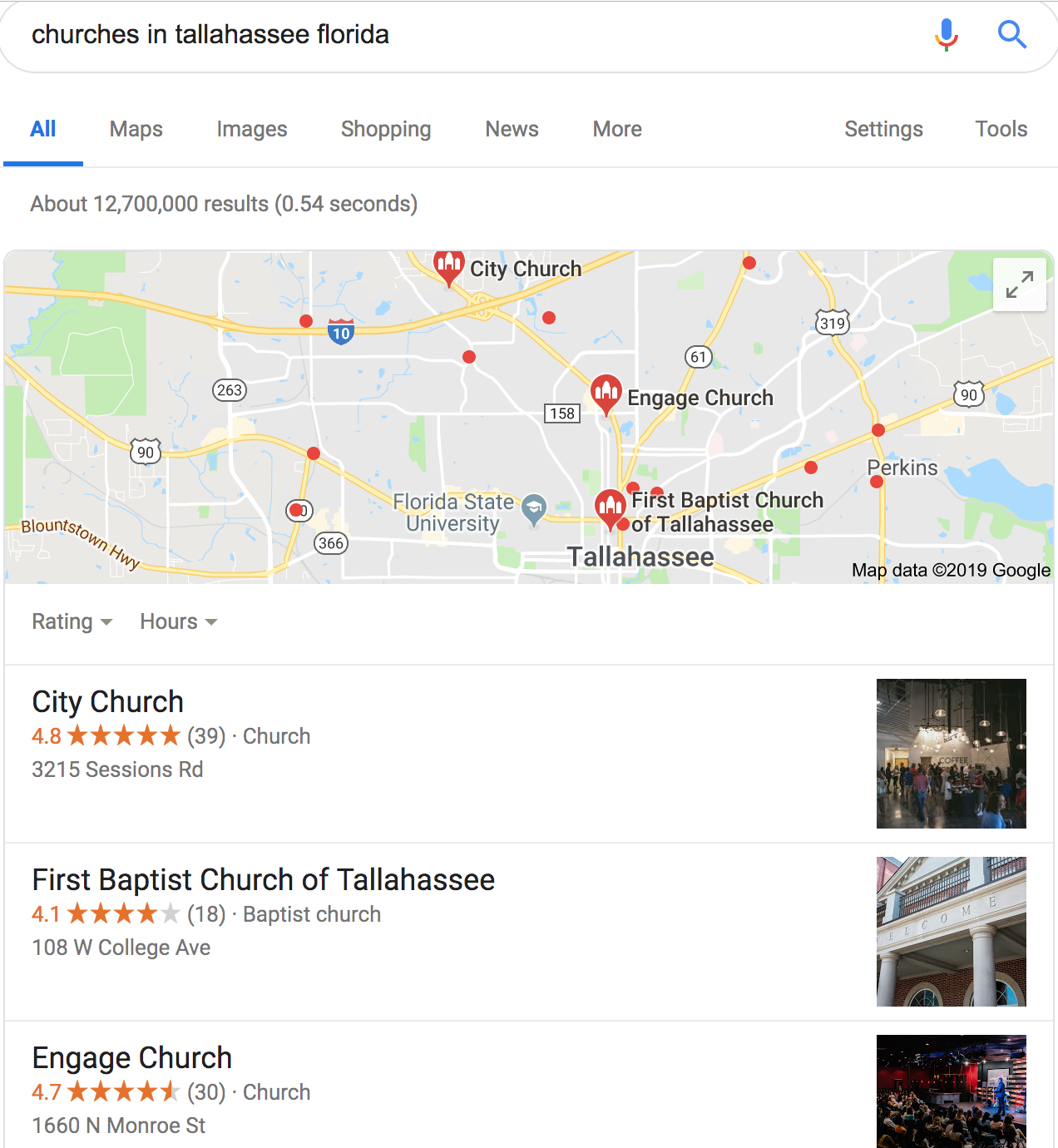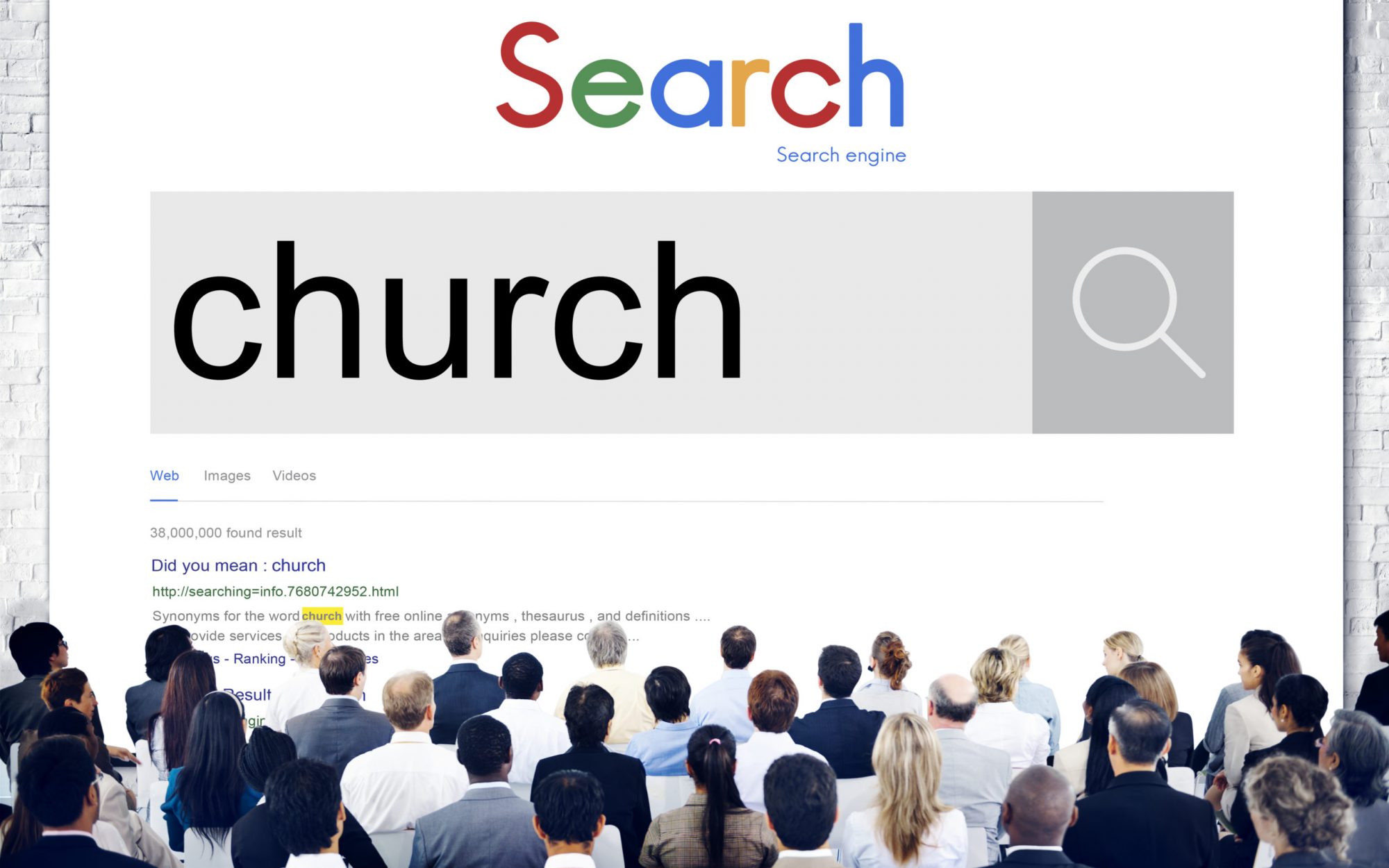First off, if you’ve made it past the headline, then bravo to you. There are a lot of people that will read the phrase “local SEO,” wonder what in the world that is, and then immediately click out of it.
Fortunately, it’s not really that complex. SEO is short for “Search Engine Optimization,” which is basically how to get your site ranked in the search engines so that they show you instead of someone else.
Local SEO is the exact same principle, except instead of trying to get your site ranked worldwide, you’re trying to get it ranked locally.
Local SEO In a Nutshell
Let’s say someone is relatively new to town, or they’re unhappy with where they’re currently attending services, or they’re just doing a little investigative work to see what else is out there, so they google “churches near me.” Google will take that search result, use their phone or computer’s GPS location, and pull up results that are actually near them.
Local SEO is how to optimize your site so that your church is number one, or at least in the top three. The top three results are what’s called the “local pack.” It’s the automatic listing that appears on the side of your Google results when you ask for a geographically-specific search. 33% of all clicks for a search term are in the local pack, while 40% click on the actual organic results that appear below.
Below is one such example of a “local pack”; you’ve most likely seen them thousands of times in your various searches.

Why You Should ABSOLUTELY Optimize for Local SEO
You don’t need me to tell you that the implications of this are enormous. In fact, I would argue that out of anything else on this site – with the possible exception of paid advertising – nothing is more important to your local outreach than local SEO. I know that’s a bold statement, but allow me to explain.
The world relies on community luncheons, social activities, and in-house cafes to drive “awareness” for their church. They believe that if they can extend their reach by offering a physical incentive, they’ll eventually be able to teach them the Gospel and add them to the Lord’s Kingdom.
Besides being a quasi “bait-and-switch” maneuver, the simplest argument against these types of activities is that you’re not actually reaching people with the Gospel – you’re reaching them with stuff. By optimizing your site for local SEO, you’re reaching people who are genuinely looking for a church, not a community center where they can do goat yoga.
According to one report, almost half of all Google searches are locally-oriented; 76% of those searches result in a phone call. In a world where 93% of local searches result in that local pack appearing in the results, the takeaway is simple: You want your church in that three-pack.
So How Can Improve Our Local SEO?
Local SEO is really not that much different from regular SEO. In short, you’re trying to develop your website in a way that makes it approachable, relevant, and resourceful. Google wants to reward their searchers with the information they’re after in the quickest amount of time, so if you can facilitate that, you win.
That’s not to say that every website is created equally. I’m sure there are lots of people out there that look at their site and think, “This is outstanding! Everyone will love our site!” (at least, I hope that’s what you’re saying; if not, you need to get back to the drawing board).
The reality is that though your website may look amazing, it still may not rank for a variety of reasons.
It’s Not Mobile-Friendly
A few years ago, mobile officially outranked desktop in terms of search quantity; these days, those numbers are even more staggering. A “mobile-friendly” website means that your site loads quick and adjusts the site automatically to appear better on a mobile device.
This is the future of search; Google even announced that they will start indexing sites based on mobile first, instead of through desktop. If a user finds your site frustrating to deal with on their mobile device, there’s a good chance they won’t visit it again. Wondering if your site is mobile-friendly? Use a Google’s Mobile-Friendly Tool to help.
You Haven’t Claimed Your Google Business Listing.
Similar to sites like Yellow Pages or Angie’s List, Google has an online directory that is available for every business – including churches.
Claiming your Google listing is simple, and allows you to manage your contact info, online reputation, and make posts and pictures that communicate your church to your community. It’s one of the most powerful tools in your marketing arsenal, so claim it and embrace it.
The Content Isn’t Local
Wherever your church is located, you need to have locally-centered material.
I recognize that the Gospel is universal, but that doesn’t mean you can’t have content on your site dedicated to the history of your local congregation, biographical info on leadership and preacher, or write an article about evangelism that mentions suburbs or neighborhoods near you. Be creative with your content and tailor it for your local, immediate audience.
It Doesn’t Have Any Links
There are two types of links you can control: internal and external. Internal links point to other pages within your website (contact info, blog, sermons, etc), while external links point to other webpages. You want both, but you also want other webpages pointing to your site as well (inbound links) since it builds credibility in Google’s eyes.
You can create these by guest posting, having your church listed in directories, or something similar. The more other people point to your site, the more authority it will have.
Your NAP Isn’t Consistent.
No, I’m not talking about your 2PM siesta. NAP stands for Name, Address, and Phone number; it’s the info that business directories use to help people find you. If your church has changed names, changed locations, or even switched your phone number, chances are that your NAP on various listings is incorrect.
Moz – a popular digital marketing company – offers a free tool that will allow you to check your NAP’s consistency, but if you want them (or others) to fix it, it’ll cost you. You can manage your NAPs individually with each website, but that will take some time, so it’s an expense either way.
Does Local SEO Matter for a Church?
Local SEO isn’t rocket science, but it can feel overwhelming if you try to do all of these things at once. Instead, break them down into manageable, bite-size chunks: claim your Google listing today, optimize it tomorrow, then work on getting a few links next week. Over time, you’ll notice your domain and search authority start to increase, and with it, probably a few more visitors through your doors.


